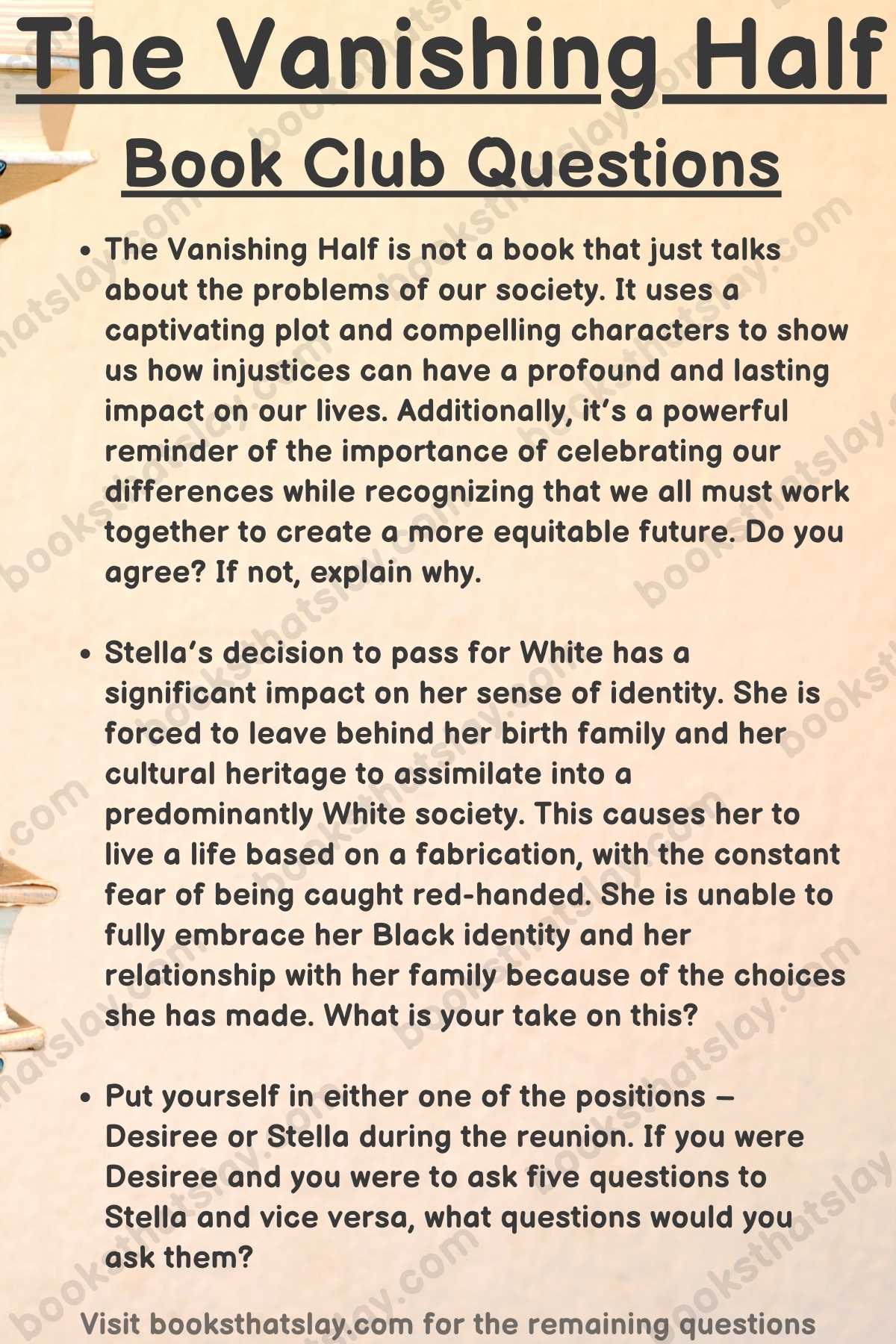14 The Vanishing Half Book Club Questions
Imagine leading a life unrecognizable from your childhood.
Brit Bennett’s “The Vanishing Half” delves into this very concept through the story of identical twins, Desiree and Stella Vignes.
Raised in a small Louisiana town, the sisters choose vastly different paths at 16, fracturing their bond. One disappears into white society, while the other returns home after escaping an abusive marriage.
The novel, set against the backdrop of the Black experience in America, explores themes of race, identity, and family through the eyes of multiple characters.
With its shifting perspectives, “The Vanishing Half” challenges our understanding of social norms and compels us to consider the complexities of race and belonging.
These book club questions delve into these themes, making “The Vanishing Half” a must-read for anyone interested in identity, family dynamics, and the experiences of people of color in America.
Also Read: The Vanishing Half Book Review

Book Club Questions For The Vanishing Half
- The Vanishing Half is not just a commentary on societal issues; it uses a gripping plot and engaging characters to illustrate the profound and lasting impact of injustices. It also emphasizes the importance of celebrating our differences while working towards a more equitable future. Do you agree with this interpretation? If not, why?
- The villagers in the book value Caucasian features and coloring, creating a community that rewards these traits. This highlights colorism and its impact on self-perception and societal opportunities. Despite this, Stella chooses to pass as white for a job. What is your perspective on her decision?
- “There were many ways to be alienated from someone, few to actually belong.” How does this line reflect the theme of belonging in the story? How can the concept of belonging be made more inclusive and open-minded to accommodate diverse backgrounds?
- How does the concept of home shape Desiree and Stella’s relationship? Do they have different visions of what home should be, or is there a common thread that binds them despite the physical distance?
- Stella’s decision to pass as white significantly impacts her identity. She leaves her birth family and cultural heritage to assimilate into white society, living a life based on deception and fear. What are your thoughts on the consequences of her choices?
- Imagine Desiree and Stella had stayed together in Mallard instead of parting ways. Do you think their lives would have been better together than the separate paths they took as adults?
- “The Vignes twins were reminders of this, tiny girls in funeral dresses who grew up without a daddy because white men decided that it would be so.” How profound is this statement in terms of racial injustice, and what message do you think the author wants to convey?
- Secrets and lies are prevalent in the story: Desiree and Stella’s initial escape, Desiree hiding from her husband, Jude’s secrets about her life and relationships, and Kennedy hiding Adele’s death. Do you think these secrets are ways to cope with shame and guilt? Discuss the negative consequences of these actions.
- Stella fantasizes about a simpler life as a white person, partly due to Blake’s financial stability. However, she remains unfulfilled in her new identity. In contrast, Desiree, despite enduring torment, finds solace with Early and their daughter. Does this make Desiree’s outcome more desirable?
- The relationship between Jude and Kennedy symbolizes the complexities of kinship and identity. Despite their differences, they share a familial bond. Does their relationship highlight the impact of previous generations’ decisions on their descendants’ lives?
- Imagine being in the position of Desiree or Stella during their reunion. If you were Desiree, what five questions would you ask Stella? If you were Stella, what five questions would you ask Desiree?
- Stella’s career as a college professor represents a part of her life not built on lies. Teaching brings her fulfillment and highlights the importance of education and opportunities. Do you think this aspect is the most significant in understanding Stella’s character?
- Acting is a recurring motif in The Vanishing Half, with characters assuming different roles to navigate their lives. In a world where we often don’t get what we want, do you think acting is a necessary tool to maintain happiness and sanity?
- The title “The Vanishing Half” reflects themes of passing and identity erasure, particularly Stella’s decision to pass as white and disappear from her birth family’s life. It underscores the fragility of identity and the influence of societal pressures. What is your interpretation of the title, and do you have an alternate explanation?
If you liked this set of questions here are a few other options you can consider.